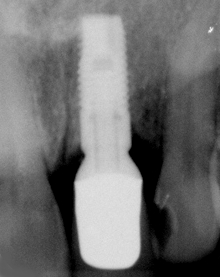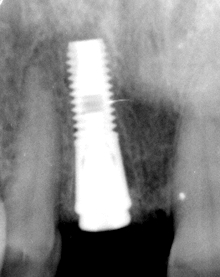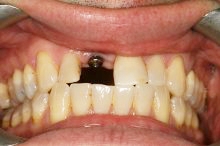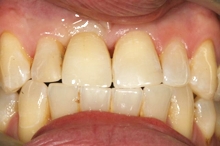Dental Implants in Sheffield
Are you looking to have Dental Implants Placed?
If you are looking to have dental implants in Sheffield, you need look no further!
What is an implant?
Dental Implants are small titanium screws that integrate with the bone to act as artificial roots supporting the construction of artificial teeth above. This allows improved function, speech and aesthetics.
Teeth in One Day
In certain situations we can provide you with fixed teeth in a day. Following your initial consultations and CT scan at our dental practice in Sheffield, the dental implants are placed in the morning. Your fixed bridge is then constructed in our onsite laboratory by our highly experienced technical team. The bridge is then fitted and is able to use that same day!
This enables you not to wear a denture at all. This cosmetic dentistry treatment can be utilised in both the upper and lower jaws. Established for over 130 years, we are one of the longest established family dental practices in Europe. Our highly experienced surgical and restorative team have placed 1000's of dental implants over the years.
What can implants be used for?
Dental implants are used when a tooth or teeth have been lost. An implant can be used to:
Dental implants are an ideal solution for replacing a single missing tooth and eliminate the need to grind down healthy adjacent teeth for a bridge.
Implants can be used to replace and support individual crowns or bridges. Support from adjacent healthy teeth is not necessary because implants act as replacement tooth roots.
In addition to looking and functioning like natural teeth, implant-supported dentures and full bridges are designed to be a stable and effective long term solution. Implants eliminate the need for adhesives to keep dentures in place.
Will I need one implant for each missing tooth?
No, unless of course only a single tooth is being replaced. It is usual for four implants to be used in the lower jaw to support 10-12 teeth, with six implants normally being used in the upper jaw. Where a few teeth are missing, two or three implants are sufficient.
Being made of titanium they are completely "biocompatible" – there is no possibility of "rejection". There are very high success rates, with ongoing research reporting 95% survival for individual implants and higher rates for implant-supported bridges. On average we place over 300 implants per year and we have documented success rates of 98% – 99% over a fifteen year period.
Generally speaking, anyone who is missing one or more teeth due to injury, disease or decay may be a candidate for dental implants. There are very few cases where implants could not be provided. "Not having enough bone" does not mean that you cannot have implants. Some patients may not have enough suitable bone to place the implants. This can, however, be rectified by our expert surgeons. The main limitations on treatment are what the patient is prepared to undergo. Age is certainly not a limiting factor, although it is inadvisable for implants to be placed in growing individuals.
Smokers are slightly more likely to develop problems with dental implants, as smoking has a significant and detrimental effect on the progression of periodontal (gum) disease, which can affect implants and teeth alike. Our specialists will determine if you are a candidate for dental implants after a careful evaluation of your dental and health history. Remember, a dental implant may not be the best solution for you and we will advise accordingly.
First, you will have a detailed consultation with one of our specialists. They will explain the procedure and show you examples. You will be given some suggestions for treatment that may suit you, together with an idea of costs and timescale.
If you decide to proceed with treatment, you will then return for "preplanning". This is an assessment and planning appointment. Following this, we will be able to provide you with a written report, proposed treatment plan and estimate detailing the timescale and cost of treatment.
Treatment with dental implants requires meticulous planning to ensure a successful, predictable outcome. A precise and delicate surgical technique is necessary and this should be provided by an appropriately trained surgeon.
The next stage is the surgical phase. This is a relatively simple, gentle, minor surgical procedure to place the implant into the bone under sterile conditions, where it is left to heal for 3 – 12 weeks. This phase is normally carried out under local anaesthesia. Intravenous sedation is available, and is often used to help those who are anxious, or having extensive treatment. Although some implants can be loaded into function immediately, or soon after surgery, it is often suggested that this period of healing is allowed for the implant to fully integrate before loading. This significantly reduces the risk of implant failure.
A temporary prosthesis is used as a transitional measure until the implants are integrated. In some carefully selected situations it is possible to place implants and restore them with teeth immediately.
For complex procedures, we are able to admit patients to a local private hospital that has appropriate facilities for in-patient treatment under general anaesthetic. Following the appropriate healing period, the restorative phase can be performed. The implant is uncovered, impressions are taken and the final restoration is fitted.
Patients undergoing complex treatment may have several of these phases progressing simultaneously. The entire procedure may take as little as a few weeks, or for complex reconstruction of severely damaged jaws, up to 18 months. The actual procedure chosen depends on several factors, such as your dental health, the number of teeth involved and which teeth are replaced. These factors will also determine the total number of visits to the dentist throughout the treatment period.
This is a surgical procedure and thus some discomfort can be expected for a few days after surgery. This is usually easily controlled with normal painkillers.
Most patients report that they had significantly less pain following the procedure than they had anticipated. You will have some stitches, which are usually dissolvable.
Treatment fees will depend on several factors, including the number of teeth being replaced and the number of implants needed to support your replacement teeth. Some additional procedures may be required prior to the placement of your dental implants to ensure long-term success.
We always provide a written fee estimate following a thorough diagnostic examination, in which the specialist will recommend the treatment that is best for you.
What can I expect from implants?
Implant-supported replacement teeth look, feel and function like natural teeth. This means that you can eat and drink whatever you are used to. But most importantly, dental implants often improve quality of life in a very concrete way. People who have felt embarrassed and worried because of their tooth problems are often overwhelmed by what new permanent teeth can do for their self-esteem.
Implant-retained replacement teeth must be cared for and checked regularly, just like your natural teeth. Implants are susceptible to periodontal (gum) disease just like teeth. You will therefore need to see the hygienist regularly, but most importantly your own oral hygiene will need to be maintained at a very high standard.
Put simply, if you look after your implants, they will look after you!
• A long lasting fixed alternative to removable dentures.
• They provide high levels of support for the replacement of several teeth.
• The ability to chew and enjoy your food in a similar way to that achieved prior to tooth loss.
• Avoids damage to adjacent teeth as required by bridges.
• Confidence that the fixed bridge or tooth replacement feels as secure as a natural tooth.
• Predictable results.






